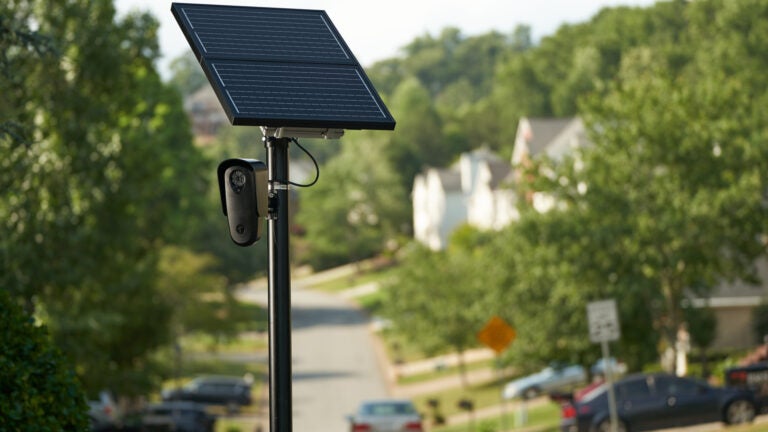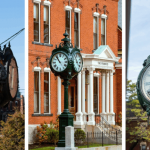Local News
The ACLU of Massachusetts warns that the surveillance technology could expose residents’ movements far beyond the town’s borders.

Chestnut Hill Realty is installing Flock license plate reader cameras along Independence Drive, on the border of South Brookline and West Roxbury, citing a rise in package and retail theft. However, the move has alarmed civil liberties advocates, who warn that the technology poses a greater threat than petty crime.
The ACLU of Massachusetts says the cameras — marketed as neighborhood safety tools — enable broad government surveillance by collecting data on everyone’s movements, not just those suspected of wrongdoing.
Kade Crockford, director of technology for the Liberty Program at the ACLU of Massachusetts, says government agencies, in this case working with private companies, are building massive databases to track people’s movements across cities, states, and the nation.
“That raises very serious constitutional questions,” Crockford said.
The issue surfaced on Sept. 29, when the Brookline Police Department discussed a proposed Memorandum of Understanding with Flock at a meeting of the Police Commissioners Advisory Committee.
Under the agreement, the police could access data captured by the cameras, which Flock would own. Chestnut Hill Realty, which is funding the cameras, would also have access to the data.
Chestnut Hill Realty did not say how many cameras it was installing. But, a statement from Jennifer Murphy, the chief operating officer for the company, said that while they haven’t observed a “specific spike in crime” on their properties, they have seen an increase in package theft and retail theft at their nearby shopping center.
Murphy says privacy is important to the company, noting that the cameras will strictly read license plates, not engage in facial recognition.
“We think of it as the digital version of a lock on a door: it’s not about intrusion, but deterrence,” Murphy’s statement said. “As the saying goes, ‘Locks keep honest people honest.’”
Murphy says the cameras will be installed and operational in the coming weeks.
But though the cameras are a done deal, Paul Campbell, the department’s public information officer, says it is ultimately up to the community whether the police sign the agreement that would give them access to the data.
A public meeting is coming, most likely by the end of the month, where a Flock representative will be present.
“Our job is public safety, and I like having tools that make it easier to make it safe,” said Campbell. “At the same time, I understand there are some concerns from some in the community who worry and don’t want the government tracking their whereabouts.”
He added, “I know that’s not happening in this department.”
Brookline residents have questioned the use of surveillance cameras for nearly two decades. In 2009, the town voted down a resolution to let the local police install traffic cameras, though the police department eventually installed the cameras on a limited basis.
In May 2018, the town created a Surveillance Technology and Military Equipment Study Committee, which published a report in 2022 reviewing local policing, surveillance technologies, and cybersecurity.
The report noted that red-light cameras, including license plate readers, could generate extensive data on residents’ movements and raised concerns about potential threats to privacy, civil liberties, and motorists’ due process.
The Brookline Police Department acquired a license plate reader around 2010–2011 using a state grant, but never deployed it after the police union objected to using GPS tracking.
“The technology isn’t inherently good or bad,” said Campbell, talking about license plate reader cameras. “It’s just technology. It’s only good or bad based on how you use it.”
Flock Safety’s License Plate Reader cameras capture images of vehicles traveling on roadways, record license plates, and identify details such as make, model, color, and unique features. The cameras alone are unable to determine vehicle ownership or identify drivers.
Flock cameras send real-time alerts if a matching vehicle appears on a police “hot list.” The list includes vehicles associated with AMBER Alerts, stolen cars, or people with outstanding warrants.
Flock has recently expanded its presence in the area, opening a new office in Boston in July with plans to employ 150 new employees in the next two years.
A Flock spokesperson says the company works with 70 law enforcement agencies in the state, including the Boston Police Department.
Flock is in over 6,000 communities and credits itself with helping solve more than 10% of reported crime nationwide.
Privacy concerns
However, even though it might sound like these cameras are combating crime, the ACLU of Massachusetts says they can cause more danger than good, especially for vulnerable communities.
Crockford said the private camera system allows police nationwide to collect real-time location data on drivers without a warrant, probable cause, or even reasonable suspicion of wrongdoing.
Crockford said the system encourages agencies to “opt in” to nationwide data sharing: departments that allow their data to be shared gain access to data from all others.
According to 404 Media, one example of misuse occurred when a Texas law enforcement agency used Flock’s national database to track a woman who allegedly self-administered an abortion. The agency allegedly lied to gain access to Massachusetts data in order to get her location.
404 Media also reports that some local police have searched Flock on behalf of ICE agents.
Crockford said Massachusetts has no law specifically regulating how police use license plate reader data.
While courts have recognized that broad, continuous location tracking can violate privacy protections analogous to those for cell-phone tracking, police in Massachusetts are not subject to state or federal statutes governing their use of this technology.
ACLU Massachusetts supports the passage of a state bill, “An Act Establishing Driver Privacy Protections,” which would limit license plate reader use by requiring data deletion within 14 days unless tied to an investigation, restricting data sharing unless mandated by the court, and barring monitoring based on First Amendment-protected behavior such as protests.
It also calls on police departments to stop voluntary data sharing, revise contracts, and require specific, documented justifications before running searches.
“We’re firing on all cylinders, working on many different issues related to the overarching problem of our law failing to keep pace with technology,” Crockford said.
Chestnut Hill Realty is adding license plate reader cameras to deter theft. Do you think that’s a good idea?
Sign up for the Today newsletter
Get everything you need to know to start your day, delivered right to your inbox every morning.




